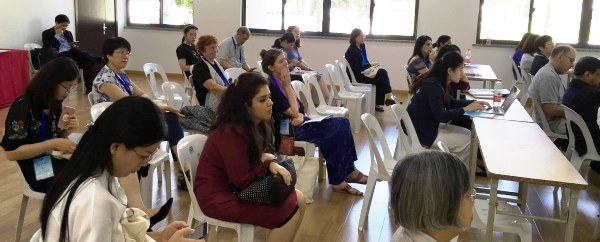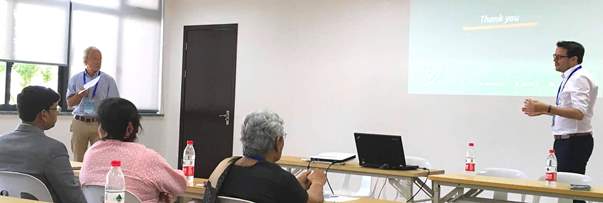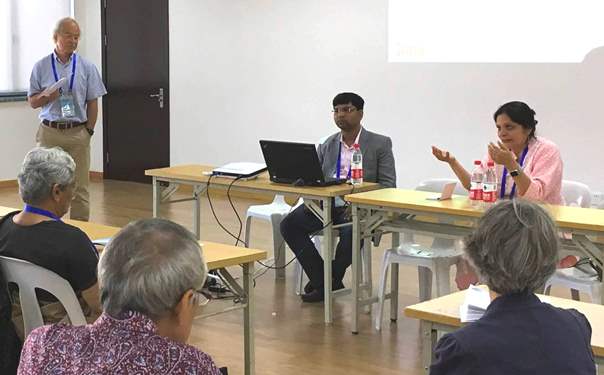IUSSP session on Innovations in Longitudinal and Cross-national Surveys at the 4th APA ConferenceShanghai, China, 13 July 2018
At the invitation of the Asian Population Association (APA), the IUSSP organized a well-attended session on cross-national and longitudinal surveys, which are an important source of micro-data for population research and provide important insights into changes in demographic behaviour over time and across countries. The session was organized and chaired by Nico van Nimwegen, IUSSP Secretary General, and included presenters working on major surveys in China, India, Indonesia, and one global cross-national survey.
Cross-national and longitudinal surveys are changing rapidly through the application of new technologies and innovations. These allow, for instance, for comparative surveys to be fielded across multiple countries simultaneously, to cover complex family structures or remote areas that previously were hard to capture, or include new sources of information such as biomarkers. In the specific area of social demography, there is an ever-expanding range of innovations that also allow for the integration of big data technologies and the internet-of-things into traditional survey processes, such as smart phone apps or wearable devices that measure concepts such as health and time use. This session allowed participants working on cross-national and longitudinal surveys to present innovations they have implemented and discuss the changing nature of the field and emerging new challenges.
The China Family Panel Study (CFPS) was introduced by Yan Sun (Center for Social Research/Institute of Social Science Survey, Peking University). The China Family Panel Studies is a national longitudinal general social survey project. By collecting data at three levels (individual, family, and community), the project aims to document changes in Chinese society, economy, population, education, and health, to provide data for academic research and public policy analysis.
The presentation covered innovations to improve the coverage of migrants, including the adoption of an Event History Calendar to collect the residential history of migrants. Sequential mixed-mode data collection was applied in response to the increasing migrant samples in CFPS.
The India Human Development Survey was presented by Sonalde Desai, Professor of Sociology, (University of Maryland, and Senior Fellow National Council of Applied Economic Research, New Delhi) and Debasis Barik (Associate Fellow at the National Council of Applied Economic Research, New Delhi). The India Human Development Survey includes over 40,000 households covering both urban and rural areas. Wave 1 of IHDS was administered in 2004-5, Wave 2 took place in 2011-12 and a third wave is planned for 2019-20.
Over this long period, households tend to divide and recombine, creating complex family relationships. Moreover, norms regarding marital exogamy lead to a large proportion of the young women in the sample leaving their natal villages to marry outside the village. The presentation focused on the challenges involved in maintaining household panels in samples with significant sex-selective migration.
Unfortunately the presentation of the Indonesian Family Life Survey (IFLS) by Firman Witoelar (Rand Corporation), which would focus on the use of dried blood spots in longitudinal surveys, had to be cancelled. The Indonesia Family Life Survey (IFLS) is a household/community level panel survey with 5 waves to date: 1993, 1997, 2000, 2007 and 2014. IFLS has collected blood samples since wave 2, in 1997, using a hand held meter (Hemocue). In 2000 IFLS began collecting dried blood spot (dbs) samples demonstrating that blood sample collection could be successfully carried out in a large scale population survey.
The Generations & Gender Survey (GGS) was presented by Tom Emery (Netherlands Interdisciplinary Demographic Institute NIDI and Erasmus University Rotterdam) who focused on the use of online data collection in longitudinal surveys. The Generations & Gender Survey is a large cross-national survey focusing on demographic behavior and family dynamics (www.ggp-i.org). In 2020 a new round of the survey will be conducted in countries across the world. In preparation for this, the GGS has run a field experiment utilizing a push to web (P2W) framework which encourages users to fill out the GGS online (CAWI) rather than through a face to face (F2F) interview. This experiment was carried out in three countries: Croatia, Germany, and Portugal, countries with very different sampling frames and internet penetration.
Discussion In the general discussion it was stressed that longitudinal surveys are vital tools in population research, providing key information on the dynamics of demographic behavior and demographic change. It was clear that these tools can successfully be applied both in more and less developed settings, and across a wide variety of cultural settings. The introduction of new techniques in these longitudinal surveys, including biomarkers and web-based data, makes them even more valuable as researchers worldwide adapt to an evolving data environment. Common issues that were discussed included response rates and panel maintenance, also data storage and data accessibility.
An important conclusion was that a professional organization such as the IUSSP would be an ideal platform for longitudinal researchers in the population field to exchange information and share best practices. The Chair mentioned that an IUSSP Panel provides an ideal framework to start such an initiative and encouraged those attending to propose such a Panel. |
|




